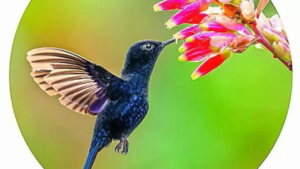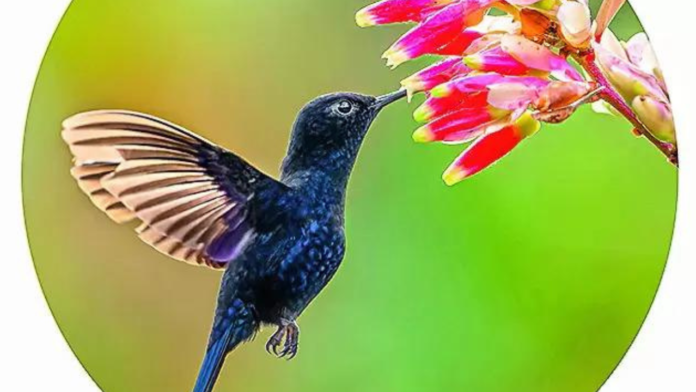‘Saving animals is ethical, it’s evocative. And it’s smart business’
Speciesism is the illusion that only human lives matter because only humans create value. Our health & wealth are deeply connected to all animals. Industry relies on conservation of nature. CSR must focus on all life
One trillion animals disappear from our planet each year.
Eighty billion livestock are farmed for food.
Two million species face extinction today.
A hundred and fifty million are still taken in poaching and trophy hunting. It’s all game.
A hundred and fifty thousand animals perish every minute.

RARER & RARER: Black Rhinos (above) and Hummingbirds (below)

These numbers are not valuations of companies. They are an anthology of loss. These are ledgers of lives, precipitously vanishing from Earth. These are also reflections of how we have come to view the world of animals through the lens of a mind-numbing commodification – indeed, we think of the lives lost each year as ‘360 million tonnes consumed worldwide’.
My keynote today is to unlock your conscience.
We are not waiting for the Sixth Extinction. We are already in the Sixth Extinction.
As apex predator, we have reshaped the world according to our own image – but at the cost of our fellow sentient beings and home planet.
And our actions bear a huge price, way beyond our own narrow anthropocentric plans. On last count, humanity has wiped out 60% of the world’s wildlife since 1970 – thanks to Alfred Nobel’s gunpowder. So much for the Nobel Prize.
But humanity can also protect our fellow animals, our common home and hearth, Earth, which we share as kin when we say, ‘Vasudev Kutumb’.
The expansive ‘kutumb’ cannot be confined to Homo sapiens alone.
Now for a personal story. I recently visited an animal rescue and rehab centre. Here, elephants, big cats, birds, reptiles and other endangered species have been saved from poachers, traffickers and circuses globally. Today, they are looked after by dedicated conservationists from around the world. From medicine to massages, organic nourishment to surgeries, these animals enjoy the warmth of positive reinforcement. The effort to achieve this transforms humanity. There is a genius within us that is sparked when we channel our intrinsic empathy.
I would like to personally recognise Anant – ‘Infinity’ personified – for his dedication in creating the ‘Star of the Forest’, Vantara. In his own words, “This is an attempt to heal the environment. It is a start at rebuilding our bond with animals.”
As his father proudly told us the next day – he has turned Charles Darwin’s theory of ‘Survival of the fittest’ on its head, making it ‘Protection of the weakest’.
Then there is Ratan Tata’s state-of-the-art hospital for small animals. This marks a good and great use of CSR. I urge the many directors across Tata companies to follow suit, by putting enhanced CSR into animal welfare, something that Mr Tata himself will surely approve of.
These are world-encompassing views that should evoke an all-life, all-planet response from us. After all, what is human progress? Is it only to be captured by the likes of GDP or per capita growth? Are all these parameters real or just an illusion?
Most businesses plan their CSR only in adjacencies, to get clawbacks, for their own enterprise. A focus on all life provides a first-mover advantage – a FOMO game-changer in CSR across industry.
Who knows? Entertainment media could be Evoked to develop Christopher Nolan’s next Dark Knight crusading against animal oppression. Pharma could strive to make medicine accessible to all animals. Construction could create equitable ways to build, which safeguard the habitat of animals and birds.
The Military Industrial Complex could report the number of animal casualties and not just humans. Other species cannot be collateral damage and waved off as ‘stuff happens’. The media accent on humans is also an iatrogenic of democracy because only humans can vote.
I invite you to re-evaluate your business strategies and AOPs. There are real-world consequences to losing the kingdom of animals. Without them, human lives will not only be far less magical but also economically unstable. There is a link between industry and animals. This appears when we look at the macro picture, which doesn’t only mean ‘macroeconomics’. It means viewing our planet’s spread and contextualising our own lives within this.
Many of our guests are achievers who have blazed paths of great success. Today, several of us are engaged in succession planning, seeking to smoothly hand over our life’s work to our next generation. However, we must be aware that we often fall prey to an adversary lingering within the chamber of our own mind. This is speciesism, the illusion that only human lives matter because only humans can create value.
Such narcissism is perilous.
It shrinks our understanding of the wondrous architecture of life.
It also hides the real math that underpins our existence.
Did you know, nature’s ecosystems generate a hundred and forty trillion dollars of value each year? This comprises everything animals do from tiny bees to trophic predators.
Industry relies on the conservation of nature.
Saving animals is ethical. It’s evocative.
It’s also smart business.
Meera Jain
Meera Jain is the founder of Times Evoke.
This article, by the founder of Times Evoke, is based on her speech at The Economic Times Awards


